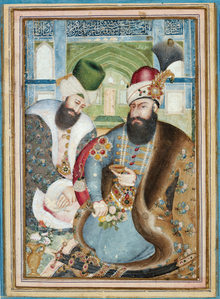Ottoman–Persian War (1775–1776)
| Ottoman–Persian War of 1775-1776 | |||||||||
|---|---|---|---|---|---|---|---|---|---|
| Part of the Ottoman–Persian Wars | |||||||||
 Karim Khan Zand with the Ottoman envoy Vehbi Efendi. | |||||||||
| |||||||||
| Belligerents | |||||||||
|
| |||||||||
| Commanders and leaders | |||||||||
|
|
| ||||||||
The Ottoman–Persian War of 1775–1776 (or Ottoman–Iranian War of 1775–1776) was fought between the Ottoman Empire and the Zand dynasty of Persia. The Persians, ruled by Karim Khan and led by his brother Sadeq Khan Zand,[5] invaded southern Iraq[6] and after besieging Basra for a year, took the city from the Ottomans in 1776.[7] The Ottomans, unable to send troops, were dependent on the Mamluk governors to defend that region.
In an attempt to raise troops and provisions for this war, Ottoman Sultan Abdülhamid I, made Suleiman al-Jalili mubayaaci (official of provisions), ordering him to send provisions to Baghdad, which he ignored, instead he restricted merchants from selling their goods.[8] As a result, the Persians held Basra until 1779 when the Ottomans, under Sulayman Agha,[9] retook the city, following Karim Khan's death.[10]
See also
References
- ^ Fattah, Hala Mundhir (1997). The Politics of Regional Trade in Iraq, Arabia, and the Gulf: 1745–1900. SUNY Press. p. 34. ISBN 9781438402376.
- ^ Encyclopedia Iranica : "In 1775 the Wakil sent his brother (Moḥammad) Ṣādeq Khan to besiege Basra in Ottoman Iraq, which after a yearlong siege was taken and occupied until Karim Khan’s death in 1779"
- ^ Dictionary of Battles and Sieges: A-E : page 113 : "Jealous of the Turkish port of Basra, Persian Regent Karim Khan sent a siege force under his brother Sadiq Khan. an Omani fleet broke the blocade but a relief force from Baghdad was repulsed and Governor Sulayman Aqa was finally starved into surrender"
- ^ Fattah, Hala Mundhir (1997). The Politics of Regional Trade in Iraq, Arabia, and the Gulf: 1745-1900. SUNY Press. p. 34. ISBN 9781438402376.
- ^ Mohibbul Hasan, Waqai-i manazil-i Rum: Tipu Sultan's mission to Constantinople, (Aakar Books, 2005), 19.
- ^ Dina Rizk Khoury, State and Provincial Society in the Ottoman Empire: Mosul, 1540-1834, (Cambridge University Press, 2002), 47.
- ^ Dina Rizk Khoury, State and Provincial Society in the Ottoman Empire: Mosul, 1540-1834, 44.
- ^ Dina Rizk Khoury, State and Provincial Society in the Ottoman Empire: Mosul, 1540-1834, 69.
- ^ 'Abd al-Hamid I, M. Cavid Baysun, The Encyclopaedia of Islam, Vol. I, ed. H.A.R. Gibb, J.H. Kramers, E. Levi-Provencal and J. Schacht, (Brill, 1986), 62.
- ^ Dionisius A. Agius, In the Wake of the Dhow: The Arabian Gulf and Oman, (Ithaca Press, 2010), 15.
Sources
- Fisher, William Bayne; Avery, P.; Hambly, G. R. G; Melville, C. (1991). The Cambridge History of Iran. Vol. 7. Cambridge: Cambridge University Press. ISBN 0521200954.
- Perry, John R. (2011). "Karim Khan Zand". Encyclopaedia Iranica, Vol. XV, Fasc. 6. pp. 561–564.
- Perry, John R. (2010). "Zand dynasty". Encyclopaedia Iranica, Vol. XV, Fasc. 6.
- Perry, John R., Karīm Khān Zand: a history of Iran, 1747–1779 University of Chicago Press, 1979, ISBN 978-0-226-66098-1 and One World Publications, 2006 ISBN 978-1-85168-435-9.
- Malcolm, John, Sir, The history of Persia, from the most early period to the present time containing an account of the religion, government, usages, and character of the inhabitants of that kingdom in 2 volumes; London : Murray, 1815.; re-published by Adamant Media Corporation 2004 vol 1. ISBN 978-1-4021-5134-7; vol. 2 ISBN 978-1-4021-5205-4.
- Perry, John (1991). "The Zand dynasty". The Cambridge History of Iran, Vol. 7: From Nadir Shah to the Islamic Republic. Cambridge: Cambridge University Press. pp. 63–104. ISBN 9780521200950.
- Garthwaite, Gene R. (2005). The Persians. Wiley. pp. 1–311. ISBN 9781557868602.
- Shaw, Stanford (1991). "Iranian relations with the Ottoman Empire in the eighteenth and nineteenth centuries". The Cambridge History of Iran, Vol. 7: From Nadir Shah to the Islamic Republic. Cambridge: Cambridge University Press. pp. 297–314. ISBN 9780521200950.
